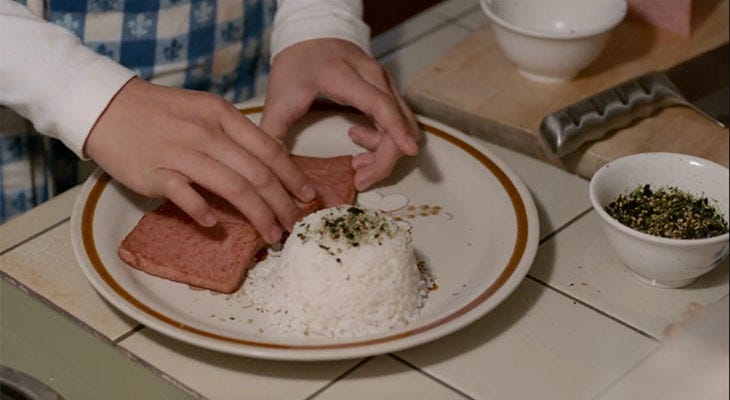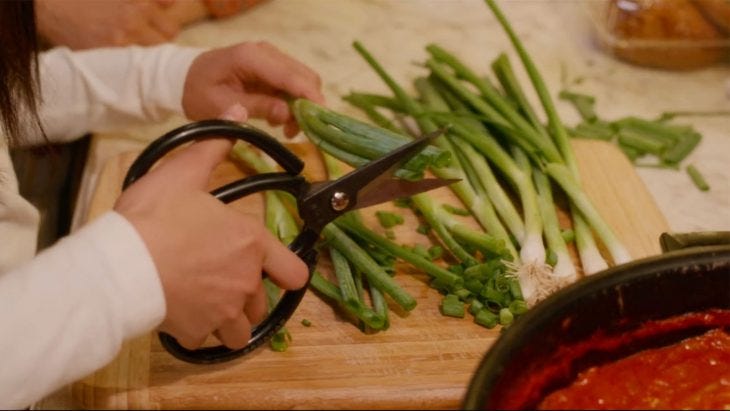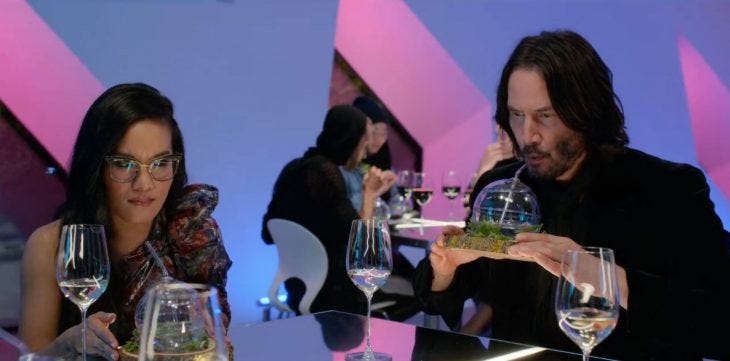Many things make Always Be My Maybe a memorable film — the kimchi-jjigae in the opening scene and Keanu Reeves are only two of them.
Sasha (Ali Wong) and Marcus (Randall Park) are neighbors in San Francisco and childhood friends. The young Sasha arrives home from school, removes her shoes by the door and listens to a recorded message from her mother that her parents are working late, she should fix dinner and not watch TV. Young Sasha fixes dinner for herself and you just know that the girl has serious ideas about eating when she sprinkles furikake over her molded rice and arranges the slices of SPAM beside it.
The doorbell rings. Marcus says his mom wanted to ask if Sasha wanted some soup. His mom makes way too much, he says, and then he'd have to bring leftovers to school in a thermos. "Nobody wants to sit next to that kid with the thermos soup. Only the other kids with the thermos soup. And I don't want to sit next to those losers."
Sasha walks with Marcus to his family's house next door. Marcus mom, Judy, is cooking kimchi-jiggae, she watches while the older woman stirs the contents of a pot and remarks, "It looks super amazing." And Judy replies, "Kimchi-jiggae is super simple but that what makes it so good. It's about using the best ingredients."
Judy stops stirring, moves to the cutting board beside the stove and starts cutting scallions with a scissor. "And we Koreans use scissors for everything. Vegetables, noodles..." She lets Sasha try it and declares she's a natural.
That's the first three minutes of Always Be My Maybe. In that short time, you get a clear snapshot of what it's like being Asian-American. They speak perfect English and their houses look standard American. Yet, they retain their Asianness... taking off shoes at the front door and cooking their traditional food.
The dilemma of wanting and trying to belong but not totally forgetting their cultural heritage. As Marcus puts it so well, he does not like bringing soup in a thermos to school because "Nobody wants to sit next to that kid with the thermos soup." But he loves his mother's kimchi-jiggae just the same, and that plays a huge role in the story.
The adult Sasha becomes a famous chef and restauranteur. She comes home to San Franciso to open a new restaurant, and bumps into Marcus and his father. The childhood friends and teenage sweethearts reconnect and things are awkward. But they try anyway and agree to go on a double date — Marcus and his girlfriend, Jenny, and Sasha and her latest flame — Keanu Reeves. He plays himself or, rather, a made-up version of himself.
Keanu arrives at a fancy restaurant wearing glasses without lenses and asks, "Do you have any dishes that play with time? The concept of time." Well, it's a fancy restaurant, so, of course, there's venison sous vide "that comes with headphones so you can hear the exact animal you are about to consume, illustrating nature's life to death cycle." Dessert? Crystallized lavender sugar bubbles which is essentially melted sugar blown into bubbles using a hair dryer. The bill? Dinner for four cost $6,400. Haute cuisine, right?
Always Be My Maybe is labeled a romatic comedy but I find that putting it in that genre is to call it superficial. It isn't. Just because the script is funny doesn't justify underrating the power of its social commentary. Keanu was hilarious but not everyone seems to get that his character was a slap in the face of (1) the shallowness and conceitedness of celebrity culture and (2) the hollow pomposity of haute cuisine.
It take more than superficial insight and a lot of guts to deal with such serious subjects — and even more serious accusarions — without falling into the trap of turning preachy and propagandist. And that's why Always Be My Maybe succeeds where other films seeking to make a political statement have failed. I've seen it twice, and I'm itching to see it again.





